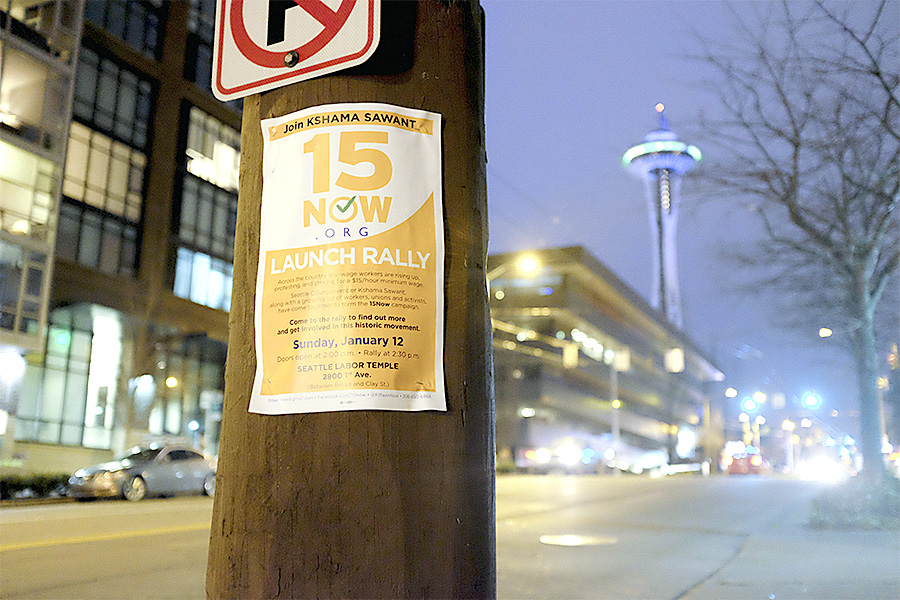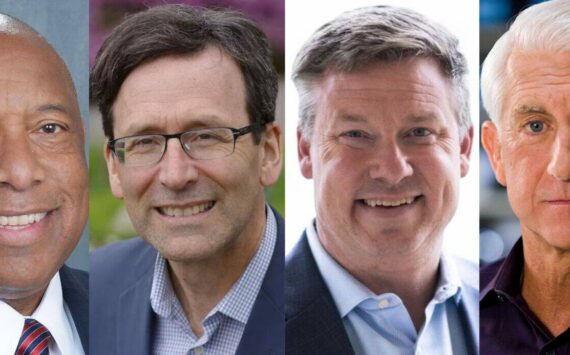A packed City Council meeting in Tacoma last week was the latest proof that the fight for workers’ rights has begun to take a firm foothold beyond SeaTac and Seattle.
On the docket was a paid sick- and safe-leave ordinance two years in the making. While Seattle passed its paid-sick-leave ordinance back in 2011, ensuring that full- and part-time workers in the Emerald City would be able to take time off with pay when they got sick or a family member fell ill, the politics of such a move have proven more challenging in Tacoma. It required finesse, in other words. As Mayor Marilyn Strickland tells it, when the idea first surfaced—thanks in no small part to timely prodding from a group of citizen activists called Healthy Tacoma—the City Council “maybe had one vote” in favor.
By last week, the Tacoma City Council had been moved to approve its paid-sick-leave ordinance. Though nearly five hours of heated debate preceded it, the final tally wasn’t even close, with only one vote against. The law will take effect in early 2016.
“Seattle’s economy is roaring at an unprecedented pace. I think we took an approach that was more unique to our situation,” Strickland tells Seattle Weekly. “I think any movement takes time for people to wrap their minds around it.”
What we are witnessing is a movement. By passing a paid sick- and safe-leave ordinance, Tacoma became one of nearly 20 cities and states across the country to do so—joining not only Seattle, but also Portland, New York City, and Newark and states including California and Connecticut. And if some lawmakers in Olympia have their way, it won’t be long until all cities in Washington enjoy the same protection. This year State Senator Cyrus Habib (D-Kirkland) and Rep. Laurie Jinkins (D-Tacoma) have each sponsored bills that would require most Washington businesses to offer some form of paid sick and safe leave to employees.
This is the third session in a row Jinkins has pushed for the legislation. She believes the tide is turning, and, citing at least a minimal amount of bipartisan support in the Senate, reports being more optimistic than ever. If the bill can get to the Senate floor, she believes it has a real shot.
“With almost any piece of legislation we have, it takes education. Some [bills] take more time to educate than others,” Jinkins says with a laugh. “I think as we see more and more jurisdictions passing [paid sick leave], it makes members feel more comfortable with it.
“I’m notoriously bad at predicting these things,” Jinkins admits. “But I would say that I’m really hopeful this year.”
Outside the Target store in Tacoma on the Saturday before the Super Bowl, two signature gatherers battled the elements and the occasional scoff to follow in Seattle’s footsteps in another way. They aim to place an initiative on the ballot to raise Tacoma’s minimum wage to $15 an hour, and were gathering the John Hancocks needed to do so.
To anyone who followed Seattle’s march toward a minimum-wage hike, the scene and playbook are familiar. Buoyed by the emergence of Socialist Alternative star Kshama Sawant, 15Now used the threat of a ballot initiative—like the one passed in SeaTac in 2013—to spur Seattle lawmakers to action on the minimum wage, resulting in an historic ordinance passed last June. While Tacoma’s Mayor Strickland says the City Council doesn’t have “immediate plans” to take up the issue, it’s not hard to foresee a similar initiative forcing her city’s hand. Strickland admits it’s a possibility.
Rest assured the similarities are no coincidence. As Ty Moore, a national organizer for 15Now, points out, since last spring regional chapters of 15Now, which got its start in Seattle, have popped up in more than 25 locations across the country, including Portland, Minneapolis, Philadelphia, and Boston. While smaller and less organized, Tacoma is one of these.
In one way or another, activists in these cities are all using a minimum-wage game plan crafted here. “As national attention developed in Seattle, more and more people began discussing how we spread the fight,” Moore says. “A number of chapters kind of sprung up in late spring and summer. We’re using Seattle as a model, but adapting to the different locations. . . . In Tacoma we’re in discussions with them over what exactly the ballot initiative should look like, but that’s absolutely happening.”
As with the paid-sick-leave movement, the minimum-wage victory in Seattle is also being felt in Olympia this session. Newly elected Sen. Pramila Jayapal (D-Seattle) was a key member of Mayor Ed Murray’s minimum-wage task force. As the former executive director of OneAmerica in Washington, she was also involved in supporting SeaTac’s minimum-wage ballot initiative.
On the third day of the session this year, Jayapal, along with state Rep. Jessyn Farrell (D-Seattle), dropped legislation that would raise the state’s minimum wage to $12 over the next four years (and tie the wage to the consumer price index after that). Jayapal points out that a poll conducted by Heart Research earlier this year showed overwhelming support for a significant increase in the minimum wage across the country—even in red states—and that here in Washington, her $12 legislation is likely “a lot more reasonable” than what voters might enact at the ballot box.
Sound familiar? That’s by design.
“We have a lot of fodder, I would say, and we have the messages. We have the model for forming a coalition of small business and labor and community—that full model of organizing support,” says Jayapal, only days after Working Washington, the group of activists who in 2013 spearheaded fast-food strikes that kicked off Seattle’s minimum-wage movement, was out in force during a committee hearing for the House of Representatives’ version of the minimum-wage bill.
“It wouldn’t be hard to mobilize the same kind of support across the state should we need it,” she continues, “if the state legislature fails to act.”
mdriscoll@seattleweekly.com








